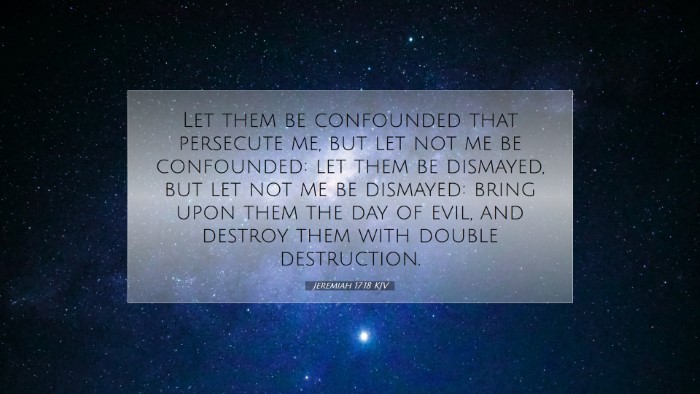Bible Commentary on Jeremiah 17:18
Verse: "Let them be confounded that persecute me, but let not me be confounded: let them be dismayed, but let not me be dismayed: bring upon them the day of evil, and destroy them with double destruction." (Jeremiah 17:18)
Introduction
The verse from Jeremiah 17:18 encapsulates a plea for divine justice in the face of persecution. The prophet Jeremiah, often referred to as the "weeping prophet," expresses a deep yearning for God's intervention. This commentary synthesizes insights from noted public domain theologians such as Matthew Henry, Albert Barnes, and Adam Clarke, providing a thoughtful understanding of the text aimed at pastors, students, theologians, and scholars.
Contextual Background
To fully grasp the meaning of Jeremiah 17:18, it is imperative to understand its contextual significance within the book of Jeremiah. This book details the ministry of Jeremiah, who prophesied during a turbulent time for the nation of Judah, calling for repentance amidst impending judgment and exile. The verse resides within a broader passage that contrasts the fate of the righteous and the wicked, intertwining themes of faith, judgment, and divine justice.
Commentary Insights
Matthew Henry’s Perspective
Matthew Henry emphasizes the personal nature of Jeremiah’s prayer. He notes the distinction between the prophet and his enemies, highlighting that while they face confusion and dismay, the righteous remain firm. Henry interprets the “day of evil” as a period of divine judgment against the wicked. He articulates that the fervency of Jeremiah’s request reflects a profound understanding of justice, whereby the prophet seeks not personal vengeance but rather divine retribution against unrepentant sinners.
Albert Barnes’ Insights
Albert Barnes provides a detailed exposition of the phrase "double destruction." He suggests that this implies a complete and utter devastation of the enemies who persecute Jeremiah. Barnes also stresses that the context indicates a reliance on God’s protection and deliverance for the righteous. He expounds on the meaning of being “confounded” and “dismayed,” relating these emotional states to the turmoil and distress experienced during times of oppression. His examination encourages believers to recognize God’s sovereignty in their trials.
Adam Clarke’s Analysis
Adam Clarke offers a nuanced interpretation, discussing the theological implications of invoking divine judgment. He highlights the importance of the phrase "bring upon them the day of evil," interpreting it as a longing for justice to be served rather than a desire for personal retaliation. Clarke also addresses the psychological dimensions of persecution, noting that the faithful may experience doubt and fear, yet the call for God to uphold their integrity stands central in the believer's response to injustice. His insights remind readers of the necessity of faith amidst adversity.
Theological Implications
- Divine Justice: The call for God’s judgment against oppressors emphasizes the justice of God, reminding believers that injustice does not escape His attention.
- Human Persecution: This verse is a reflection of the very real struggles faced by God’s prophets and messengers. It encourages an understanding of the spiritual warfare in which believers engage.
- The Role of the Righteous: Jeremiah’s unwavering faith serves as an exemplar for believers, illustrating that they are to trust in God’s ultimate plan, even when surrounded by turmoil.
Practical Applications
- Prayer for Deliverance: Believers are encouraged to bring their concerns and requests for justice before God, emulating Jeremiah’s model of honest communication with the divine.
- Faith amidst Trials: The call to remain steadfast in one's faith, even when facing intense opposition, is a central theme that can guide pastoral care and counseling.
- Understanding God’s Sovereignty: Emphasizing the importance of recognizing God’s control over circumstances reassures believers that He works all things for good, even in the face of persecution.
Conclusion
Jeremiah 17:18 highlights the complexity of faith in the midst of suffering. It serves as a reminder of the importance of seeking divine justice while remaining anchored in the hope that God will uphold the righteousness of His people. Through the insights of Matthew Henry, Albert Barnes, and Adam Clarke, we gain a multifaceted understanding of this verse, positioning it as a powerful element of biblical faith that resonates through generations.


